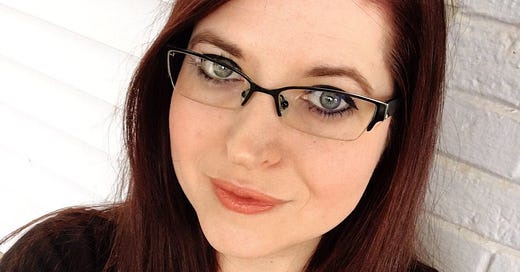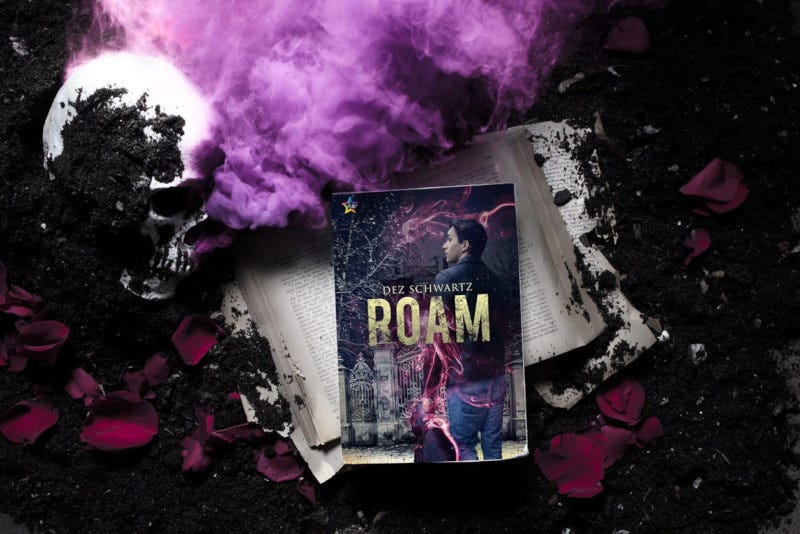First off, tell us a little about yourself. How do you see yourself as a writer?
I’m a dreampunk/paranormal author that writes a lot of pro-LGBT stories. I also have a BFA in studio art and work at an art museum. I live in Texas with my family and enjoy traveling when I can. As a writer, I tend to refer to myself as neo-romantic because I draw a lot of inspiration from early romanticism and gothic literature (Wilde, Byron, Shelley, etc.) and explore themes of existentialism; but with a healthy dose of humor to balance out some darker themes.
I love when dreampunk overlaps with comedy. Movies like Brazil and Raising Arizona and series like The Mighty Boosh and Over the Garden Wall come to mind. What (or who) makes you laugh? Is that anything like the sort of humor you include in your fiction?
I love Over The Garden Wall! That series was so well done… I think comedy that I enjoy is vastly different from the comedy in books. In my books, it’s a bit more casual banter and play-on-words; very P. G. Wodehouse-ish. Whereas, I enjoy over-the-top comedies such as shows like Parks and Rec, The Office, Reno 911, etc.
I know what you mean. Comedy is different in print. Which writers have influenced you the most? How did their work lead you to dreampunk?
Oscar Wilde is definitely my biggest influence. Although, I can’t really credit him for the dreampunk influence. That actually came to me through my interpretation of my favorite ’80s music. I listened to a lot of Echo and the Bunnymen, and for me, their songs evoked a dream world that I ended up utilizing in my storytelling.
Where did you first hear the term “dreampunk,” and what does it mean to you personally?
I actually found out about “dreampunk” after I had already been writing it. It was about two years ago when I first saw the term used while I was searching for different ways to describe one of my books and was immediately excited when I saw the term. To me, it’s a sci-fi/fantasy subgenre that utilizes dreams, the subconscious, and sometimes dream travel.
In the context of dreampunk, what would you say constitutes a “dream”? Would a mystic vision count? A psychedelic trip? A system of delusions? How about a computer simulation?
In my own work, I’ve only dealt with actual dreams. Save for a particular scene that did involve a mystic vision. However, I think dreampunk benefits from a broad range of possibilities. All of the above are acceptable especially since dreampunk can easily cross multiple genres.
Have you ever pulled anything from your dreams to include in your fiction?
You’d think I would have but, actually, no. Haha, maybe soon though!
Well, keep us posted. Can you think of any examples of books, movies, art, or music that really capture the feeling you want your work to have?
I’ll always have to refer back to the works of Oscar Wilde and Echo and the Bunnymen for this kind of question. Along with that, Night Riots is also a great example of atmospheric music. Other people have told me that my work makes them think of a “dappered up” version of Anne Rice or Joss Whedon.
Nice. Dapper is good. How do you hope to shape the dreampunk genre with your work?
At the moment, I’m in a unique position having written LGBT dreampunk; helping it to be recognized as one of the more inclusive genres of science fiction/fantasy. Along with writing, I’m also an artist. I’d like to be one of the creators that really hopes hone in on a recognizable style. Steampunk is a great example of a genre that can be visually identified immediately. I’d like to see dreampunk reach that level of recognition as well.
That sounds awesome. How can we help? What should we buy, and where can we find it?
The first book in my dreampunk series, Roam, is having an official re-release through NineStar Press on October 1st, just in time for the Halloween season! For all of my other work, you can check out my website DezSchwartz.com or follow me on Instagram (@dezschwartzauthor), Twitter (@dez_schwartz), and Facebook (DezSchwartz).
Roam (2016–2017) by Dez Schwartz
Ethan Roam suffers from night terrors and vivid daydreams. A lifelong friend introduces him to the eccentric Dr. Grady Hunter, who he believes can help. After making some new (and perhaps, not entirely human) friends and being thrust into a life surrounded by the supernatural, Ethan quickly learns that there was more reality to his dreams than he suspected.
Update: Dez contributed to the dreampunk short story collections Mirrormaze (2020) and Somniscope (2023)!




